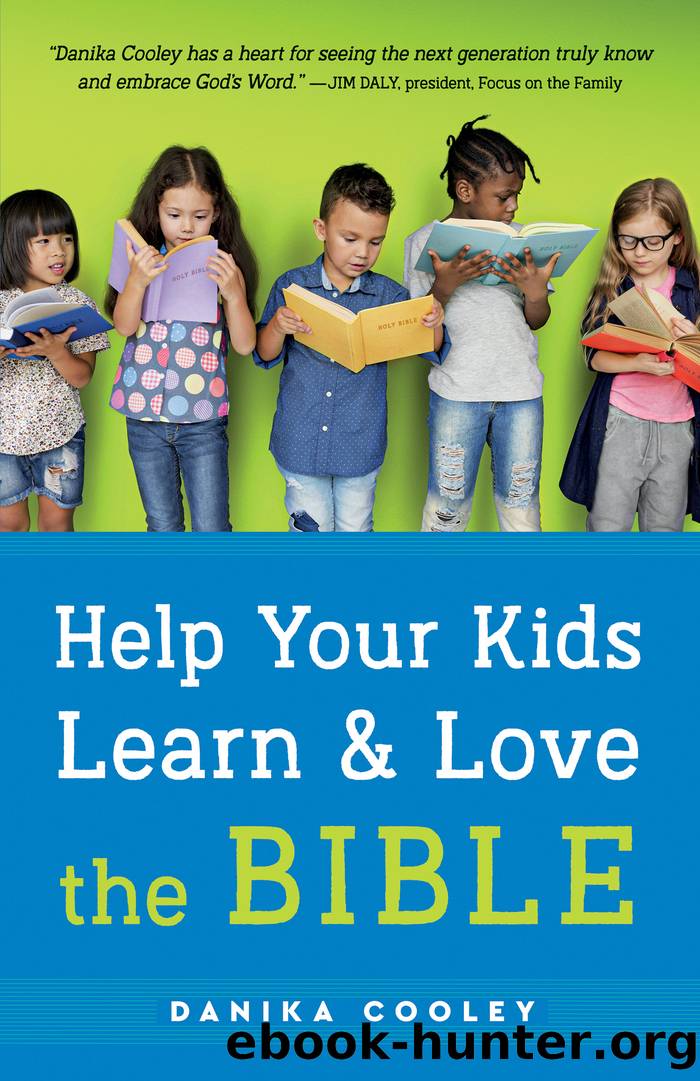Help Your Kids Learn and Love the Bible by Danika Cooley

Author:Danika Cooley
Language: eng
Format: epub
Tags: Christian Living/Parenting;Bible—Children’s use;Bible—Study and teaching (Elementary);Religious education of children;Children—Religious life;REL012160;REL012120;REL012000
Publisher: Baker Publishing Group
Published: 2021-04-20T00:00:00+00:00
Donât get weird
I knew a man who based his familyâs diet on Genesis 1:12: âThe earth brought forth vegetation, plants yielding seed according to their own kinds, and trees bearing fruit in which is their seed, each according to its kind. And God saw that it was good.â This friend would eat only fruits and vegetables with seeds on the inside. No strawberries allowed. Nor would he eat carrots, spinach, mushrooms, or turnipsâthey were missing internal seeds.
Thatâs a weird way to read the Bible. There is no implicit or explicit command in that verse at all. Instead, we learn God made plants that reproduce. We find out plants produce the same kind of plants, often through seed. Most important, we learn God created the heavens and the earthâand it was good. We discover God is a good, loving, and creative God, providing food and habitat for his creatures even before he creates them.
The danger of reading the Bible weirdlyâwithout regard for wise guidelinesâis that we may miss the point. We might miss Jesus and the free gift of salvation available through him. Exegesis is the process of carefully studying a section of the Bible to find the authorâs original, intended meaning. Hermeneutics is the process of applying the Bible to our lives today. It involves careful interpretation of the text. After we decide what the author originally meant to communicate, we must decide how that impacts us today. We need to remember the Bible is our authority. We are not in authority over the text. We avoid imposing things on Scripture that arenât there, or removing information thatâs clearly stated.
The first principle of reading the Bible is to read clear text clearly. The Bible is clear when it comes to God, our sin, salvation through Jesus, and the way we are to live as believers. We donât need to take clear instructions and make them weird. We donât develop doctrine from parts of the Bible that are hard for even the most studied Bible scholars to understand. Thatâs a recipe for heresy. Instead, we develop doctrine from Scripture that is clear.
Since weâre reading the Bible for its clear meaning, letâs be careful to read each passage for a single meaning. Unless Jesus or a Holy Spiritâinspired writer of Scripture reveals a second meaning to a passage, we shouldnât add one. We arenât in the role of the Holy Spirit, finding rare and secret meanings to Godâs words. We can trust Godâs revealed words to be sufficient, clear, authoritative, and necessary. When we start inventing meaningsâor following invented meanings others are teachingâwe run the risk of falling into heresy, or even blasphemy.
We read Scripture in the light of other Scripture. God never lies, he doesnât change, and he always agrees with himself. If thereâs an area of the Bible weâre unsure about, we consider what the rest of Godâs Word says about the subject. There are some wonderful biblical theology books for children that help with establishing a right doctrine. Catechisms will help in this area as well.
Download
This site does not store any files on its server. We only index and link to content provided by other sites. Please contact the content providers to delete copyright contents if any and email us, we'll remove relevant links or contents immediately.
Substitute Parents by Gillian Bentley Ruth Mace(738)
Sex positions - 2 Books in 1 - Kama Sutra and Tantric Sex Guide for Couples by Transform Your Sexual Life.pl(407)
How to Raise an Mvp by unknow(320)
Parents Ask, Experts Answer by Tina Nocera(301)
The Reluctant Single Dad: A Grumpy, Damaged Brother's Best Friend Romance by Cayla Lucas(294)
How to Hire a Nanny by Guy Maddalone(215)
Being the Mom by Emily Watts(199)
Making Children Mind without Losing Yours by Kevin Leman(189)
The Surprising Purpose of Anger (Nonviolent Communication Guides) by Marshal B. Rosenberg(188)
Power of Mothers by Celia Lashlie(168)
When You Say 'thank You,' Mean It by Mary O'Donohue(165)
Questions Kids Ask about Sex by J. Thomas Fitch(161)
The MicroRNA Quantum Code Book by Unknown(154)
Holding On And Hanging In by Lorna Miles(154)
I Didn't Do It by Unknown(151)
40,001 Best Baby Names by Diane Stafford(146)
Design of Synthetic Surrogates for the Macrolactone Linker Motif in Coibamide A by unknow(140)
The Everything Parent's Guide to Raising a Gifted Child by Sarah Herbert Robbins MEd(139)
Loving Your Child Too Much by Tim Clinton(138)
